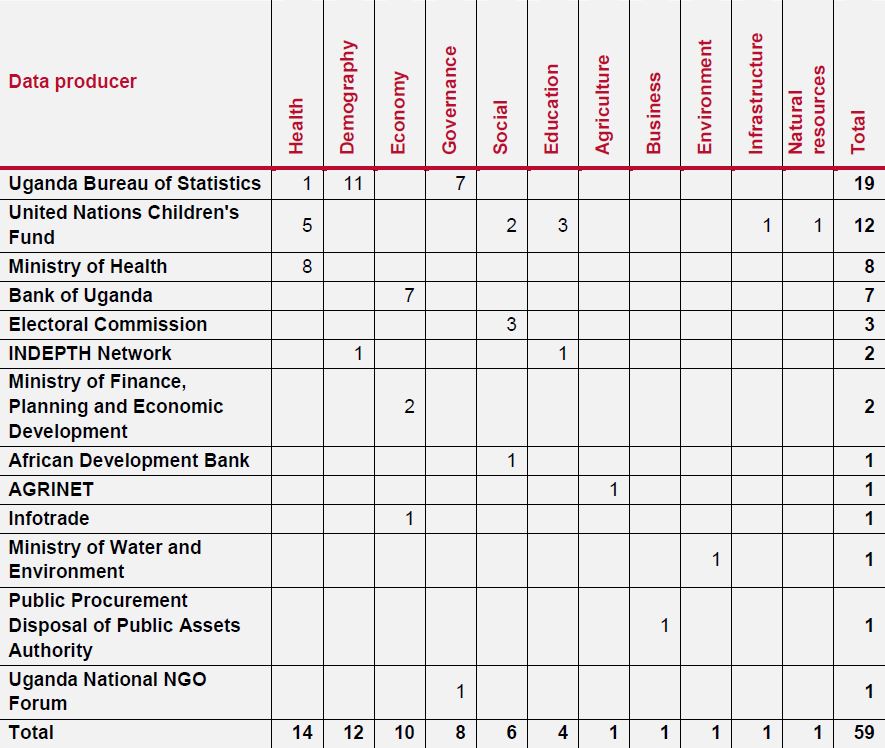National, continental and global development agendas are all calling for data to play a catalytic role in both the meeting and monitoring of ambitious goals. This study assesses the readiness of the Ugandan national statistical system – an ecosystem that includes both official and non-governmental producers and users of data – to meet these challenges.
We have designed a database to capture and classify key attributes about data producers, data sources and data sets. We have conducted research to identify 92 organisations that produce 1,150 unique datasets published in 300 unique documents or platforms. The inventory is currently available as a downloadable Excel file and an online workbook .
We have classified these datasets by type of publisher, sector, timeliness and frequency of production, by provenance, geographic scope and level of disaggregation, method of collection, and accessibility. We hope to refine this methodology to contribute to a collaborative, generic methodology that can be used for all countries.
Our analysis of all 1,150 datasets using this methodology is, in this first part of the study, purely quantitative. We make no attempt at this stage to identify which of these datasets is more important than another. This will be the main focus of the second part of the study.
Based on timeliness and disaggregation criteria we find 59 high-quality datasets produced by 13 separate institutions. We find the Uganda Bureau of Statistics (UBOS) well placed to build on its existing strengths to lead a data revolution for sustainable data.
We find that the biggest challenges facing the national statistical system lie in the production of more timely, disaggregated data.
We find that the biggest obstacle facing UBOS and the data ecosystem in general is insufficient financial investment from both domestic and external sources.
Key findings
- The multi-stakeholder national statistical system in Uganda, led by UBOS, is in a very healthy position to press forward with a data revolution that will play a key role in delivering Uganda’s Vision 2040 and Africa’s Agenda 2063 while also meeting as best it can the shorter-term demands of the global 2030 Agenda for Sustainable Development.
Best practice : primary datasets in Uganda by publisher and sector that are disaggregated (to district or lower), timely (published since 2014) and accessible (public and online)
- What is more remarkable is that Uganda’s statistical progress has been achieved despite a debilitating lack of financial investment and support that has a direct impact on the human and technological capacity available and on operational ambitions. The excellent Community Information System – which requires more funding to extend its scope from 47 to all 112 districts – is facing retrenchment due to a lack of investment.
- A lack of investment is also the major reason for slow progress in developing a functioning civil registration and vital statistics system. UNICEF has supported the establishment of a Mobile Vital Record Systems , which is yielding promising results in registering births, although it is hampered by insufficient funding. Vital statistics derived from registering deaths is literally non-existent.
- Two big challenges face UBOS: the timeliness and frequency of key data products; and the level of geographic disaggregation they contain. These two issues will be a major focus of the second part of this study.
Next steps
- Part Two of this report will take a more qualitative approach to analysing the data inventory. It will identify the most important datasets needed to meet the 2030, 2040 and 2063 Agenda commitments and assess whether they are fit for purpose. It will explore the opportunities and challenges presented by new technologies. And it will attempt to quantify what an ecosystem of interconnected data communities will look like if data revolution rhetoric turns to realit
- DI will replicate this study for Kenya.
- We will continue to develop and refine our data inventory and the structure of this study to develop a generic template for use in other countries.
- We will collaborate and share with our partners in other organisations and initiatives who are working on similar work streams to build a single common resource for documenting the real-world challenges of the data revolution.
Report figures
Homepage image credit © UNFPA
